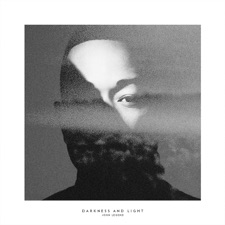John Legend
John Legend’s sixth studio album opens with a burst of impassioned singing that sounds remarkably like a statement of intent. “They say sing what you know, but I’ve sung what they want,” he offers on a track called I Know Better, over a sparse piano backdrop. “Some folks do what they’re told, but this time, baby, I won’t.”
You do find yourself wondering if this isn’t a reference to Darkness and Light’s predecessor, 2013’s Love in the Future, the album that spawned Legend’s biggest hit to date, All of Me. The latter sold 12m copies and is clearly destined to soundtrack newlyweds’ first dances for the rest of eternity: in the event of a post-apocalyptic societal breakdown, when weddings take place in caves and involve eating the flesh of your mutual enemies in lieu of a cake, you suspect there’ll still be somebody in the corner banging two rocks together and wailing about loving your curves and your edges and your perfect imperfections. That kind of universal songwriting isn’t to be sniffed at, but elsewhere on Love in the Future, there was the distinct sense that Legend was steering his career rather too directly down the middle of the road.
In fairness, Legend has never been one of R&B’s edgier artists: in the world of American radio, they classify his style of music as urban adult contemporary, which sums things up quite neatly. Still, the excess of syrup felt a bit disappointing, particularly after 2010’s Wake Up!, on which Legend, energised by campaigning for Barack Obama, reworked a selection of 70s soul protest songs in the company of the Roots.
Perhaps Legend thought so too. Certainly, he seems energised once more by current events, as evidenced by his Twitter feed in the run-up to the US election and his angry, eloquent appearance on Bill Maher’s Real Time TV show three days after it. Even the credits of Darkness and Light seem to suggest a fresh sense of focus. It took a team of 24 producers and 44 writers to bring Love in the Future to fruition, whereas Darkness and Light was almost entirely produced by one man, Blake Mills, best known for his work on Alabama Shakes’ Grammy-nominated Sound and Color – the sparse, spaced-out southern soul sound of which gets rebooted to considerable effect on the album’s title track, complete with a guest appearance from the Shakes’ lead singer Brittany Howard, her voice weaving around Legend’s.
Meanwhile, the supporting cast of writers behind Legend and Mills has been slimmed to a mere 12, which by the standards of modern mainstream R&B albums counts as very much a skeleton staff. Among the credits lurk some fairly intriguing sounding combinations: Will Oldham working in tandem with the author of One Direction’s Best Song Ever; Oldham sideman Matt Sweeney – a man who has played guitar with Current 93 and fronted math-rockers Chavez – alongside Julia Michaels and Justin Tranter, who co-wrote Justin Beiber’s Sorry and Selena Gomez’s Good for You.
Moreover, Darkness and Light is an album bookended by striking political statements. I Know Better is followed by Penthouse Floor, arguably the best thing here. It starts out like a proud, hip-hop-styled assertion of black financial muscle, but something about the music feels uneasy: the scratchy guitar jars against the liquid bassline, the strings sound oddly tense. Then there’s Chance the Rapper’s guest verse: no sooner has he gained access to the titular penthouse than another guest racially abuses him and pushes him to his death.
By the album’s conclusion, a sense of wracked disenchantment seems to have taken over entirely. Same Old Story sets it to a backing of mangled vocoder and strings, like an urban adult contemporary take on the sound of Bon Iver’s recent 22, A Million. Marching into the Dark opts for a sparse scattering of vocal samples, clicks and guitar, the ebullience of the chorus’s melody at odds with the song’s lyrical bleakness (“What good is a dream when the dreamer dies?”) and the coda of queasy strings that brings the album to its conclusion.
But in between, Darkness and Light is slightly uneven. You’re occasionally struck by the idea that Legend and Mills are engaged in the act of throwing interesting arrangements at some pretty straightforward pop music, with varying degrees of success. Love Me Now has distorted backing vocals, a riff played on an out of tune piano and a propulsive rhythm track (not to mention a video featuring footage shot in Standing Rock, Orlando’s Pulse nightclub and an Iraqi refugee camp), but it can’t quite hide how identikit the song at its centre is. The production on What You Do to Me, however, really lifts the song out of the ordinary: it slips from a noisy, lurching bassline to a weird mass of multitracked guitars – they rise out of the mix about a minute in, then vanish, never to return – to something that sounds like booming stadium rock overlaid with echoing noise.
You can understand the desire to occasionally alter the album’s emphasis from the political to the personal – it’s the kind of thing Legend’s 70s idols did all the time – but even the most devoted fan might find their empathy running on empty when they reach Overload, a duet with Miguel which turns its attention to another of 2016’s burning issues: the daily struggle faced by John Legend in maintaining his relationship with a supermodel while in the media spotlight.
Elsewhere, though, he pulls the shift off with aplomb. Surefire and Temporarily Painless both pit a romantic relationship against the “nightmare” of the world outside. “Can we just forget about Trump for a bit and have it off?” seems to be the basic message, of which it’s hard not to feel Legend’s great hero Marvin Gaye would have wholeheartedly approved. If your spirits sink slightly when you note that he’s written a song about his baby daughter, Right By You scrupulously avoids gloopy sentiment. Instead, it prickles with unease about the future – “Just take care,” it pleads, gloomily, while the music follows suit: a mournful, insistent piano figure, topped off with Kamasi Washington’s flickering sax. Behind the melody, there’s a jazz influenced chord sequence. It never quite lands where you think it’s going to, and for all its occasional missteps, Darkness and Light pleasingly suggests that, six albums in, John Legend’s musical career might have started doing the same thing.
– The Guardian Review (https://www.theguardian.com/music/2016/dec/01/john-legend-darkness-and-light-review)







